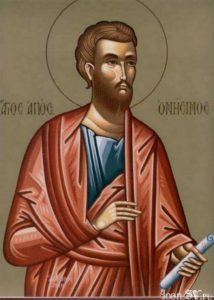The Book of Philemon is too often overlooked when reading through the New Testament. A mere 25 verses long, the short letter by the Apostle Paul to a wealthy leader of the Church in Colossae is easy to flip past when searching for Hebrews, James, or Revelation. Those who do take the time to read the epistle, however, will be treated to a valuable lesson about Christian love, forgiveness, and the importance of restoration.

St. Onesimus (Wikipedia Commons)
Paul writes his letter to his friend and co-worker in the faith while awaiting trial in Rome. More accurately, the letter is written to both Philemon and to those fellow believers gathered to worship in Philemon's house (v. 2), indicating that the author intends for his message to have a broader application than merely to the specific case at hand.
After praising Philemon for his love for Christ and for his fellow believers (to whom he refers as "saints" (vv. 5, 7), Paul begins his plea on behalf of Onesimus, a former slave of Philemon's who ran away and later connected with Paul in Rome. The circumstances about Onesimus' departure are unclear, but considering the distance between Colossae and Rome is over 1,200 miles, there is good reason to believe that he stole from his master to finance the trip. At the very least, Onesimus had left his responsibility (and his outstanding debts) to Philemon, seeking to start a new life far away from the previous one.
As Paul prepares to send the slave back to his master, he makes an appeal for Onesimus, to whom he refers as his child (v. 10) and "his very heart" (v. 12). Onesimus has come to faith during his exodus, and Paul has become his spiritual mentor and father. Paul has become so attached to this young Christian that he admits contemplating keeping him in Rome, allowing Onesimus to serve him as a proxy for Philemon, who is himself indebted to Paul as his spiritual mentor.
"If you consider me your partner," Paul writes, "receive him as you would receive me" (v. 17). He offers to repay any debt that Onesimus might owe Philemon, while reminding Philemon of his own debt owed Paul for his proclamation of the Gospel.
But Paul does not desire that Philemon acquiesce to his will merely out of obligation. Instead, he speaks of the value that comes with having another worker in the Kingdom of God in the fold. "For this perhaps is why he was parted for you for a while," says Paul, "that you might have him back forever, no longer as a slave, but more than a slave, as a beloved brother—especially to me, but how much more to you, both in the flesh and in the Lord" (vv. 15-16).
Onesimus' value is now much more than that of a mere slave under the authority of his master—it is as a "beloved brother," loved of God, whose work now has eternal dimensions. Making a play on Onesimus' name (which translates as "useful"), Paul says, "Formerly he was useless to you, but now he is indeed useful to you and to me." Onesimus has become one of the saints, and Paul urges his friend to display the same love and support for him as he has for his fellow believers in the past.
WELCOMING BELOVED BROTHERS AND SISTERS
Paul's call to Philemon to forgive and welcome back Onesimus should resonate with churches today as they welcome formerly incarcerated men and women back into their communities. Many of the over 650,000 individuals who leave prisons across the country every year struggle with tangible issues like where to live and how to find employment, as well as with spiritual questions of self-worth and belonging. The Church is tasked with reminding these people of their eternal value, proclaiming the Gospel in Word and deed, providing for their physical needs, and equipping them to be "useful" in serving God through serving others.
In the case of Onesimus, Philemon is encouraged not to view his runaway slave in the light of past wrongdoing, but as a brother in Christ and fellow heir of the Kingdom. Philemon is "more than a slave"—he is now family.
The Church is never more like it's Savior when it is offering redemption and restoration. For fellow believers that come into their midst after paying the price for past misdeeds, Christians should rejoice, for what the world sees as having limited worth, God sees infinite value. In these earthen vessels resides the power of God to change the world.
It should not be forgotten that Paul writes this letter to Philemon while he himself is behind bars. Paul understands first-hand what it is like to be separated and isolated from the larger Body of Christ, and the importance of continued prayers and encouragement. Even as he expresses his appreciation to Philemon and those gathered in his house for their support, he urges them to extend that same courtesy to Onesimus.
As Paul concludes his letter, he expresses his confidence that Philemon will go well beyond what he has asked, warmly receiving his lost servant as both an act of love and of obedience. May the Church be faithful in its charge to "remember the prisoner," knowing that it is the love we have for each other that sets us apart as His disciples.